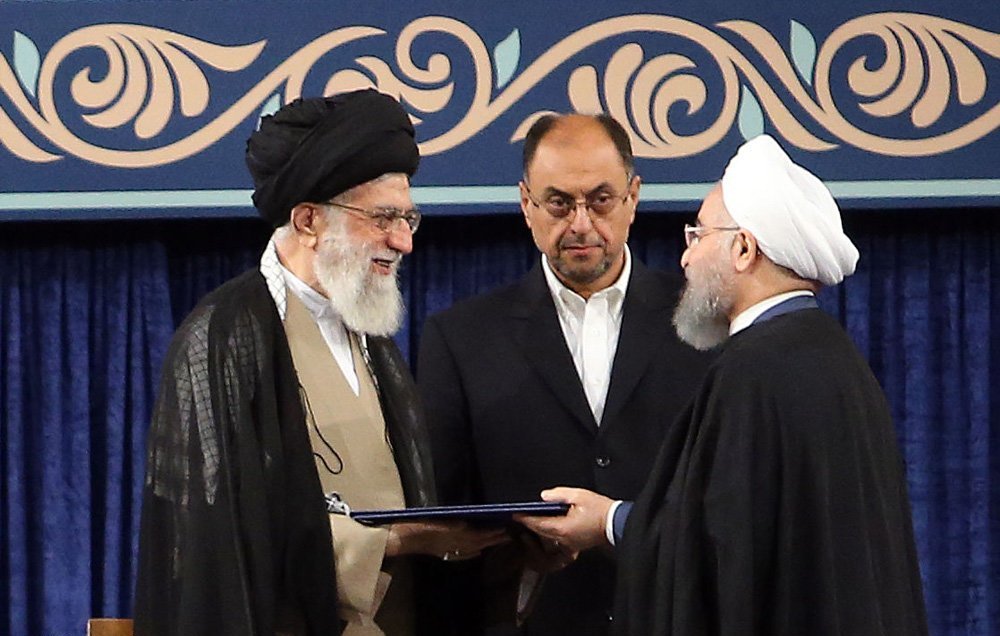Iran’s president Hassan Rouhani was sworn in for a second term during a ceremony held on Thursday after being officially approved by the Supreme Leader, Ayatollah Ali Khamenei, who gave Rouhani a decree to assign him his duties.
On May 19, the 68-year old Rouhani won a second term as Iran’s twelfth president after securing 57 percent of the vote and defeating his main rival, hardliner Ebrahim Raisi. Rouhani, who is considered politically moderate, has faced criticism from conservatives for his efforts to rebuild ties with the West.
According to Iranian election law, the president-elect is required to garner the official approval of country’s highest ranking political and religious authority, the Supreme Leader, before being sworn in before parliament. Rouhani will attend an oath-taking ceremony in parliament on August 5.
“The Islamic establishment never accepts to be isolated in the world; we emphasize constructive interaction with world within framework of constitution,” Rouhani said addressing government and military officials and foreign ambassadors at the Imam Khomeini Mosque in Tehran on Thursday.
On Wednesday US President Donald Trump signed into law a bill that imposes mandatory penalties on people involved in Iran's ballistic missile program and anyone who does business with them. The law also applies terrorism sanctions to the Revolutionary Guards, and enforces an arms embargo. The bill, which had passed both houses of Congress with overwhelming majorities, also includes new sanctions against Iran and North Korea.
“The Revolutionary Guards (IRGC), not just the IRGC Quds Force, is responsible for implementing Iran’s international program of destabilizing activities, support for acts of international terrorism and ballistic missiles,” read a US House of Representatives resolution of the bill.
During the ceremony on Thursday Khamenei referred to new sanctions, but brushed them off by noting how past attempts to reign in Iran only emboldened its leaders.
“They sanctioned Iran, but sanctions made us aware of our potentials; despite all hostilities, the Islamic Republic is more powerful than ever,” Khamenei said during the ceremony. “We are not afraid of the enemy's plots, and we know how to deal with them. The revolutionary identity and diligent work will help the country to move ahead, despite all countering measures by the enemy," he said.
In July 2015 Iran reached a deal with the five permanent members of the UN Security Council plus Germany over its nuclear program. Known as the Joint Comprehensive Plan of Action (JCPOA), the deal requires Iran to curb its nuclear program in exchange for the lifting of nuclear-related sanctions. Sanctions related to its missile programs remained in place, however, and after Trump’s signing of the new bill on Wednesday are ratcheted up.
Condemning the new sanctions, Iran’s Deputy Foreign Minister Abbas Araqchi said that “the nuclear deal has been violated and we will show an appropriate and proportional reaction to this issue.”
The deal was negotiated under President Rouhani’s first administration, which believed it would pave the way for foreign, especially European, entities to invest in and cooperate with Iran in the energy, banking and engineering spheres. The deal has already paid off, as Iran has launched multi-billion dollar railway projects, for example, since sanctions were lifted in January 2016.
Rouhani has also invited large foreign companies to invest in Iran’s oil and gas sectors, valued at around $200 billion. Meanwhile, Rouhani’s hard-lined detractors see his efforts as an attempt to sell off Iran’s resources to the West.
Political analysts presume that political future of moderates and reformists in Iran hinges on the way Rouhani will form his cabinet in his new administration. Rouhani has harshly criticized the Islamic Revolutionary Guards Corps (IRGC), a key conservative establishment in Iran, for its influence on the economy, and underlined his government’s commitment to entrust more economic activities to the private sector.
The IRGC was founded as a branch of Iran's Armed Forces after the 1979 Iranian Revolution. During the presidency of hardliner Mahmoud Ahmadinejad (2005-2013), the IRGC assumed a dominant role in the Iranian economy, essentially controlling the petrochemical, banking, construction, media and telecommunications sectors.
In 2007, the US designated the IRGC’s elite unit, the Quds Force, as a terrorist organization, accusing it of “providing material support to the Taliban and other terrorist organizations.” That same year the US Department of the Treasury blacklisted the construction and engineering firm Khatam al-Anbia and several other IRGC companies.







 Azerbaijan and Armenia started the process of demarcation of their border on Tuesday, with the installation of the first border markers based on ge...
Azerbaijan and Armenia started the process of demarcation of their border on Tuesday, with the installation of the first border markers based on ge...
 President Aliyev emphasized the critical role of the North-South Transport Corridor in fostering transport cooperation between Azerbaijan and Russi...
President Aliyev emphasized the critical role of the North-South Transport Corridor in fostering transport cooperation between Azerbaijan and Russi...
 Armenian sappers commenced on Monday mine-clearance operations in the territories adjacent to the Saint Mary Church in village of Voskepar (Armenia...
Armenian sappers commenced on Monday mine-clearance operations in the territories adjacent to the Saint Mary Church in village of Voskepar (Armenia...
 Russian Foreign Minister Sergei Lavrov has reasserted that Moscow has no intentions to stop the fighting in Ukraine, even if peace talks commence.
Russian Foreign Minister Sergei Lavrov has reasserted that Moscow has no intentions to stop the fighting in Ukraine, even if peace talks commence.



